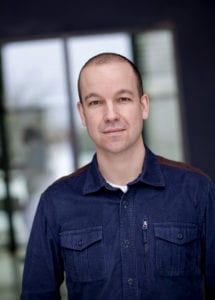Media Contact:
Nalini Padmanabhan
ASHG Communications Manager
301.634.7346
press@ashg.org
For Immediate Release
Tuesday, October 21, 2014
10:30 am U.S. Pacific Time (UTC-05:00)
Findings Reported at ASHG 2014 Annual Meeting

Foto. Mikael Wallerstedt
BETHESDA, MD – Age-related loss of the Y chromosome (LOY) from blood cells, a frequent occurrence among elderly men, is associated with elevated risk of various cancers and earlier death, according to research presented at the American Society of Human Genetics (ASHG) 2014 Annual Meeting in San Diego.
This finding could help explain why men tend to have a shorter life span and higher rates of sex-unspecific cancers than women, who do not have a Y chromosome, said Lars Forsberg, PhD, lead author of the study and a geneticist at Uppsala University in Sweden.
LOY, which occurs occasionally as a given man’s blood cells replicate – and thus takes place inconsistently throughout the body – was first reported nearly 50 years ago and remains largely unexplained in both its causes and effects. Recent advances in genetic technology have allowed researchers to use a blood test to detect when only a small fraction of a man’s blood cells have undergone LOY.
Dr. Forsberg and colleagues studied blood samples from 1,153 elderly men aged 70 to 84 years, who were followed clinically for up to 40 years. They found that men whose samples showed LOY in a significant fraction of their blood cells lived an average of 5.5 years less than men whose blood was not affected by LOY. In addition, having undergone LOY significantly increased the men’s risk of dying from cancer during the course of the study. These associations remained statistically significant when results were adjusted for men’s age and other health conditions.
“Many people think the Y chromosome only contains genes involved in sex determination and sperm production,” said Jan Dumanski, MD, PhD, co-author on the study and a professor at Uppsala University. “In fact, these genes have other important functions, such as possibly playing a role in preventing tumors.” When LOY takes place, Y chromosome genes are not expressed, and this tumor prevention would be reduced.
Interestingly, LOY in blood cells is associated with many different cancers, including those outside of the blood system. This may be because Y chromosome genes enable blood cells to assist with immunosurveillance, the process by which the immune system detects and kills tumor cells to prevent cancer.
“Our hypothesis is that LOY disrupts the immunosurveillance normally conducted by blood cells, allowing tumors to grow unchecked and develop into cancer,” Dr. Forsberg said.
These findings suggest a new approach to early detection of cancer risk in men: a blood test to assess LOY. “LOY is not very dangerous in a small fraction of blood cells, but becomes increasingly predictive of cancer as more cells lose their Y chromosome,” Dr. Forsberg explained. “This takes years, so you’d have a window of time to do something to reduce your risk.”
The researchers are currently exploring LOY in more detail, including the effects of various lifestyle factors and other health conditions. They are also examining the frequency and consequences of LOY in different types of cells and throughout the life course.
Press Availability: Dr. Forsberg will be available to discuss this research with interested media on Tuesday, October 21, 2014, from 2:30-3:30 p.m., in the ASHG 2014 Press Office (Room 22).
Reference: Forsberg L et al. (2014 Oct 21). Abstract: Mosaic loss of chromosome Y (LOY) in blood cells is associated with shorter survival and higher risk of cancer in men. Presented at American Society of Human Genetics 2014 Annual Meeting. San Diego, Calif.
About the American Society of Human Genetics (ASHG)
Founded in 1948, the American Society of Human Genetics is the primary professional membership organization for human genetics specialists worldwide. Its nearly 8,000 members include researchers, academicians, clinicians, laboratory practice professionals, genetic counselors, nurses, and others with an interest in human genetics. The Society serves scientists, health professionals, and the public by providing forums to: (1) share research results through the ASHG Annual Meeting and in The American Journal of Human Genetics; (2) advance genetic research by advocating for research support; (3) educate current and future genetics professionals, health care providers, advocates, policymakers, educators, students, and the public about all aspects of human genetics; and (4) promote genetic services and support responsible social and scientific policies. For more information, visit: http://new.ashg.org.
9650 Rockville Pike | Bethesda, MD 20814 | 301.634.7300 | society@ashg.org | new.ashg.org
Connect with ASHG on Twitter (@GeneticsSociety) | Facebook | LinkedIn
